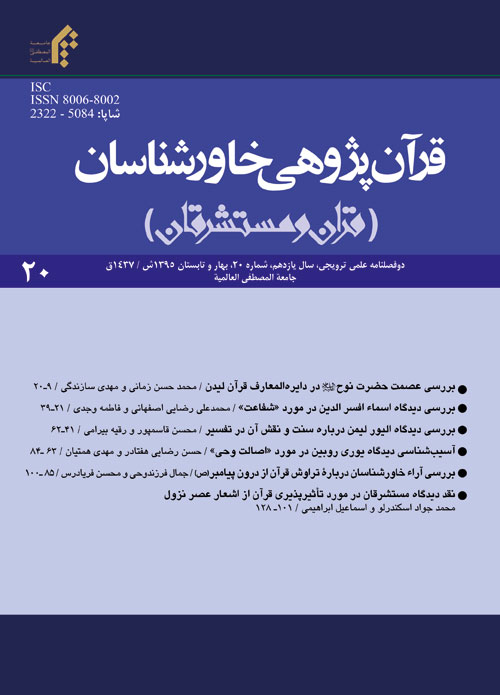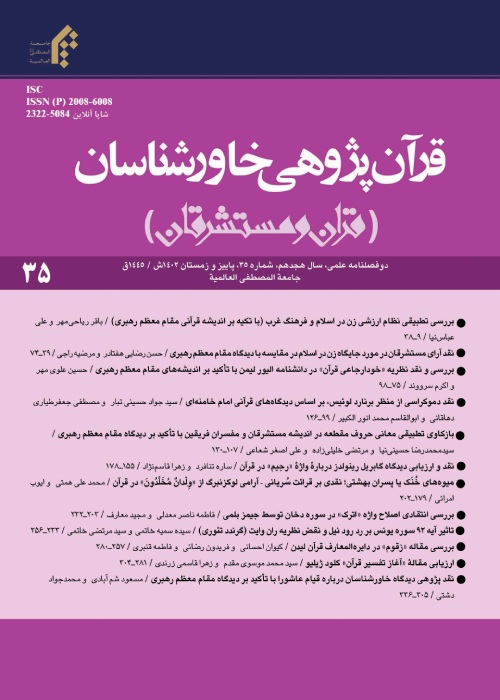فهرست مطالب

نشریه قرآن پژوهی خاورشناسان (قرآن و مستشرقان)
سال یازدهم شماره 1 (پیاپی 20، بهار و تابستان 1395)
- بهای روی جلد: 80,000ريال
- تاریخ انتشار: 1395/06/14
- تعداد عناوین: 6
-
-
صفحه 9نوشتار حاضر موضوع «عصمت حضرت نوح(ع)» در دایره المعارف قرآن لیدن را مورد بررسی قرار داده است. نوح(ع) نخستین پیامبر از سلسله پیامبران اولوالعزم(ع) می باشد که قرآن کریم مکررا از او یاد نموده است. در عظمت این پیامبر الهی همین بس که خداوند حضرت ابراهیم(ع) را از پیروان نوح(ع) دانسته، و ریشه دین ابراهیمی را همان توحیدی می داند که نوح(ع) پایه گذاری کرده است. شبهاتی که در کتب مختلف و درباره عصمت این پیامبر عظیم القدر مطرح شده، بیشتر شامل: رویگردانی و توبیخ خداوند از نوح(ع)، عدم استجابت درخواست نوح(ع) در نجات فرزندش، عدم علم نوح(ع) به کفر فرزندش، نسبت دادن مطالب خلاف عصمت به ایشان، نسبت دادن خیانت به همسر نوح(ع)، طلب توبه و بخشش از خداوند توسط نوح(ع) که برخی از آنها در مقالات دایره المعارف قرآن لیدن مطرح شده است. در این نوشتار شبهات و اشکالات مطرح شده از سوی مستشرقان نسبت به حضرت نوح(ع) مورد بررسی و نقد قرار گرفته و به آنان پاسخ مستدل عقلی، قرآنی و روایی داده شده است.کلیدواژگان: قرآن، خاورشناسان، دایره المعارف قرآن لیدن، مستشرقان، عصمت، نوح (ع)
-
صفحه 21نوشتار حاضر بررسی ونقد مقاله «شفاعت» در دایره المعارف قرآن الیورلیمن به قلم اسماء افسر الدین استاد دانشگاه نوتردام ایالات متحده می باشد. افسر الدین آیات ناظر به «شفاعت» و نظر مسلمانان درباره این موضوع را مطرح کرده است و با تکیه بر عقیده «وهابیت» شفاعت و زیارت را مردود می داند. اما از نظر قرآن کریم شفاعت غیر استقلالی و با اذن الهی امری ثابت است. همچنین شفاعت جریان رحمت الهی است و شامل کسانی می شود که مورد رضایت خداوند باشند و شفاعت بت ها که پندار ناروای مشرکان بوده، مردود دانسته شده است. شفاعت با بت پرستی در مواردی همچون استقلالی نبودن شفاعت شفیعان، رشد و تعالی فرد در محبت شفاعت کنندگان، جایز نبودن پرستش شافعان، دارای حیات و شعور بودن شفیعان، مشروط بودن شفاعت و صاحب اختیار نبودن شفیعان در ذلت یا عزت و پیروزی یا شکست تفاوت های اساسی دارد؛ بنابراین، معادل دانستن این دو مقوله مناسب نیست؛ از این رو، در این نوشتار ثابت شده که باورهای فرقه وهابیت در مورد شفاعت برخلاف تعالیم مکتب اسلام است.کلیدواژگان: قرآن، روایات، شفاعت، اسماء افسر الدین، وهابیت، بت پرستی
-
صفحه 41نوشتار حاضر به معرفی و بررسی مقاله «سنت و نقش آن در تفسیر» به قلم پرفسور «الیور لیمن» سرویراستار کتاب «قرآن: یک دایره المعارف» می پردازد.
نویسنده مقاله برای سنت در تفسیر قرآن کاربردهایی از جمله منبع قانون گذاری بودن، تفسیر مبهمات قرآن، بسط آنچه به صورت خلاصه در قرآن آمده، محدود کردن قوانین و احکام عمومی، شرح و تبیین آنچه در قرآن به صورت کلی آمده و ذکر تفاصیل مورد نیاز در به کارگیری حکم اسلامی را ذکر کرده و ذیل هر مورد آیات و روایات تفسیری آنها را آورده است. عدم ذکر موارد کارکردهای حدیث در نقش منبع تفسیر به صورت منسجم و دسته بندی شده، بیان نادرست برخی از این کارکردها در تفسیر آیات منتخب، استناد صرف به اقوال مشهور اهل سنت و احادیث متفرد و جعلی آنان، از نقاط ضعف این مقاله است که در خلال بررسی هر یک از کاربردهای ذکر شده برای سنت در تفسیر قرآن، بررسی شده اند.کلیدواژگان: قرآن، خاورشناسان، سنت، تفسیر، قرآن یک دایره المعارف، الیور لیمن -
صفحه 63آقای روبین در مقاله «محمد» در دایره المعارف قرآن لیدن ضمن تشکیک در دریافت وحی ، منشا قصص قرآنی را کتب مقدس دانسته است. وی همچنین ادعا کرده است خود پیامبر(ص) نیز در ماهیت واقعی آنچه بر او نازل شده، دچار تردید شده است. روبین در قسمتی از مقاله اش به بحث القای شیطان در وحی الهی اشاره کرده به مسئله عصمت پیامبر(ص) خدشه نموده است.
در این پژوهش، بحث اقتباس قرآن از کتب پیشین مورد بررسی و نقد قرار گرفته و سستی و بی پایگی این نظریه به اثبات رسیده است. همچنین تردید پیامبر(ص) در ماهیت وحی و بحث القای شیطان در وحی نقد شده است و دلایل رد آن بیان شده است.کلیدواژگان: قرآن، مستشرقان، یوری روبین، وحی -
صفحه 85تامل و تفکر در معارف قرآن کریم، این نکته را بیان می کند که منبع و منشا آن لازم است از وجودی برتر از ماده سرچشمه بگیرد. عده ای از خاورشناسان به تشکیک در اصل منبع آن پرداخته اند. نقل و عقل سلیم، وجود هرگونه منبع و منشایی جز وحی را برای قرآن کریم نمی پذیرد و منابعی چون نبوغ شخصی پیامبر(ص)، ضمیر ناخود آگاه، صرع و هیستری و غلیانات روانی پیامبر(ص) را رد و نفی می کند؛ چه متن کلام الهی بیانگر نزول آن از ناحیه وحی است و منکران را به هماوردی و آوردن مثل آن دعوت می نماید. پژوهش حاضر در نظر دارد تا با بهره گیری از واقعیت های موجود، تاریخی و نقلی و به هدف تجزیه و تحلیل دیدگاه های این گروه از خاورشناسان درباره منبع قرآن به بررسی و نقد آرا آنان بپردارد.کلیدواژگان: قرآن، پیامبر اکرم(ص)، وحی، مستشرقین، مصدر قرآن
-
صفحه 101پژوهش حاضر به یکی از شبهات مهم مستشرقان یعنی تاثیرپذیری قرآن از اشعار عصر نزول که نتیجه و پیامد آن بشری بودن قرآن را ثابت می کند، پرداخته است. مهم ترین اشعاری که مستشرقان روی آن حساب باز کرده اند، اشعار «امرو القیس» و «امیه بن ابی صلت» دو تن از شاعران دوران عصر نزول است که در این نوشتار مورد بررسی و نقد قرار گرفته و در نتیجه روشن می گردد که قرآن تحت تاثیر اشعار عرب نبوده است. و چه بسا این شاعران از قرآن اثر پذیرفته باشند و مفاهیم قرآنی را در اشعار خود گنجانیده باشند.کلیدواژگان: قرآن، تاثیرپذیری قرآن، مستشرقان، شعر، امیه ابن ابی صلت، امرو القیس
-
Page 9This paper examines the infallibility of Prophet Noah according to the Leiden Encyclopedia of the Quran. Prophet Noah was the first in the series of Ulū al-ʿAzm prophets and is discussed frequently in the Qurʾān. One signifier of the eminence of this divine prophet is the fact that God named Prophet Abraham as one of the followers of Prophet Noah. Furthermore, God asserts that the Abrahamic religion is rooted in monotheistic concepts promoted by Prophet Noah. Doubts cast about the infallibility of this great prophet posited in various books mainly include rejection and rebuke of Noah by God, denial of Noah's request for the salvation of his son, Noah's ignorance of his sons unbelief, attribution of matters incompatible with infallibility to Noah, attribution of infidelity to his wife, and Noah's repentance and prayers for forgiveness. Some of these matters are also mentioned in the Leiden Encyclopedia of the Quran. This paper critically examines doubts posited by orientalists concerning Prophets Noah, providing evidential responses based on reason, the Qurʾān, and Islamic traditions.Keywords: Quran, orientalists, Leiden Encyclopedia of the Quran, infallibility, Prophet Noah
-
Page 21This study critically examines the entry Shafāʿa written by Asma Afsaruddin, a professor at Indiana University in Bloomington, in The Quran: An Encyclopedia edited by Oliver Leaman. Afsaruddin discusses verses concerning Shafāʿa as well as the views of Muslims in this regard. Making use of Wahhabi ideas, she rejects Shafāʿa and Ziyāra. The Holy Qurʾān, however, approves of dependent Shafāʿa authorized by God. Shafāʿa is an effusion of God's mercy and can only be carried out by those accepted by God. Therefore, the Shafāʿa of idols, an unwarranted notion of polytheists, is rejected. Shafāʿa fundamentally differs from idolatry in terms of the dependence of Shafāʿa of those who perform Shafāʿa, the growth and development of the individual through love for those who perform Shafāʿa, the inadmissibility of worshiping those who perform Shafāʿa, the life and intelligence of those who perform Shafāʿa, the conditionality of Shafāʿa, the lack of power of those who perform Shafāʿa in engendering greatness or abjection and victory or defeat. It is therefore inappropriate to consider these two equivalent. On this basis, this paper demonstrates that the beliefs of the Wahhabi sect concerning Shafāʿa are contrary to the teachings of Islam.Keywords: Quran, traditions, Shafaa, Asma Afsaruddin, Wahhabism, idolatry
-
Page 41This paper examines the entry, Sunna and Its Role in Interpretation by Oliver Leaman in The Quran: An Encyclopedia also edited by Oliver Leaman. The author of this entry has listed various uses of Sunna in interpreting the Qurʾān. These include use as legislative sources, interpretation of ambiguities in the Qurʾān, explication of general statements and condensed ideas in the Qurʾān, limitation of general laws and precepts, and presentation of necessary details for applying Islamic decrees. Under each case, the author has presented Qurʾānic verses and traditions. Some shortcomings of this entry include presentation of the uses of traditions as sources of interpretation in an incoherent and unclassified manner, incorrect explication of some of these uses in selected interpretations of the Qurʾān, and citation of only popular Sunni traditions as well as unique and fabricated Sunni traditions. These shortcomings are discussed beside the examination of each application cited for Sunna in interpretation of the Qurʾān.Keywords: Quran, orientalists, Sunna, interpretation, The Quran: An Encyclopedia, Oliver Leaman
-
Page 63In the entry Muḥammad in the Leiden Encyclopedia of the Quran, expressing doubts concerning the Prophets reception of revelation, Rubin considers the origin of Qurʿānic stories to have been the Bible. He even claims that the Prophet of Islam himself had doubts about the true nature of what was revealed to him. In part of his entry, Rubin touches upon the idea of Satans suggestions in divine revelation which, if accepted, would compromise the infallibility of the Prophet. The present article critically examines the notion of a biblical origin for the Qurʿān, demonstrating its untenability and lack of support. Furthermore, the ideas of the Prophet's doubts concerning the nature of revelation and Satan's suggestion in revelation are challenged on the authority of concrete evidence.Keywords: Quran, orientalists, Uri Rubin, revelation
-
Page 85Contemplation of the teachings in the Holy Qurʿān indicates that it must have originated from a metaphysical entity. Some orientalists cast doubts on such an origin for the Qurʿān. Both historical data and sound reason deny the possibility of any origin for the Qurʿān save for revelation. Thus, sources such as the Prophet's genius, unconscious, epilepsy, hysteria, and other mental phenomena are unfounded. The Qurʿān itself declares that it is revelation, and challenges deniers to bring a similar text to match. The present article critically examines such orientalist views concerning the origin of the Qurʿān using historical data and traditions.Keywords: Quran, the Prophet of Islam, the Prophet's character, inner self, orientalists, origin of the Quran
-
Page 101The present article examines one of the serious doubts presented by orientalists concerning the Qurʿān; the alleged influence on the Qurʿān by poems from the era of revelation. A consequence of this belief is the notion of a human origin for the Qurʿān. The most important poems that orientalists based their statements upon include the poetry of Imruʾ al- Qays and Umayyah ibn Abī al-Ṣalt, contemporaries of the revelation era. These poems are critically examined in the present paper, demonstrating that the Qurʿān has not been influenced by Arabic poems. In fact, many of these poets may have been influenced by the Qurʿān, integrating Qurʿānic ideas into their poems.Keywords: Quran, influence on the Quran, orientalists, poetry, Imru al Qays, Umayyah ibn Abi al Ṣalt


